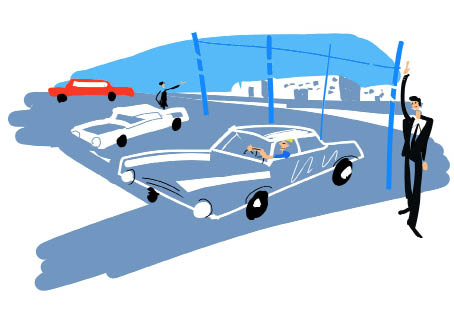
Conversation
珍妮: 马克,你 会 开车 吗?
Zhēnnī: Mǎkè, nǐ huì kāichē ma?
Jenny: Mark, do you drive?
马克: 会。 我 在 中国 考了 驾照。
Mǎkè: Huì. Wǒ zài Zhōngguó kǎole jiàzhào.
Mark: Yes. I got my driver’s license in China.
珍妮: 我 打算 寒假 去 学车。 你 能 给我 一些 建议 吗?
Zhēnnī: Wǒ dǎsuan hánjià qù xuéchē. Nǐ néng gěiwǒ yìxiē jiànyì ma?
Jenny: I plan to take driving lessons in the winter vacation. Do you have any advice for me?
马克: 首先 要 在 一个 驾校 报名,
然后 参加 交通 规则 的 培训 和 考试。
Mǎkè: Shǒuxiān yào zài yíge jiàxiào bàomíng,
ránhòu cānjiā jiāotōng guīzé de péixùn hé kǎoshì.
Mark: You should first of all sign up at a driving school, then go through training and an exam on traffic regulations.
珍妮: 通过后 就 可以参加 道路 驾驶 的 培训 了 吗?
Zhēnnī: Tōngguòhòu jiù kěyǐ cānjiā dàolù jiàshǐ de péixùn le ma?
Jenny: After that will I be able to take driving lessons on the road?
马克: 是的。 这 部分 学习 有 一定 难度, 要 下点儿 功夫 才行。
Mǎkè: Shìde. Zhè bùfen xuéxí yǒu yídìng nándù, yào xiàdiǎnr gōngfu cáixíng.
Mark: Yes. That part is not easy. You need to expend some effort on it to become proficient.
珍妮: 学车 大概 要 花 多少 钱?
Zhēnnī: Xuéchē dàgài yào huā duōshǎo qián?
Jenny: How much will driving lessons cost?
马克:大概 四千多 元。
Mǎkè: Dàgài sìqiānduō yuán.
Mark: About RMB 4,000.
New Words
1. 开车 kāichē drive
2. 驾照 jiàzhào driver’s license
3. 建议 jiànyì advice
4. 驾校 jiàxiào driving school
5. 报名 bàomíng sign up
6. 交通规则 jiāotōng guīzé traffic regulations
7. 培训 péixùn training
8. 功夫 gōngfu effort
9. 大概 dàgài about
Grammar
The aspectual particle 了 is suffixed to the verb, indicating completion of an action.
For example:
我在中国考了驾照。
Wǒ zài Zhōngguó kǎole jiàzhào.
I got my driver’s license in China.
Exercise: Put the following sentences in the right order adding 了
For example:
珍妮 小说 买 一本
Zhēnnī xiǎoshuō mǎi yìběn
Jenny novel buy a
珍妮买了一本小说。
Zhēnnī mǎile yìběn xiǎoshuō.
Jenny bought a novel.
1. 弟弟 牛奶 一杯 喝
Dìdi niúnǎi yìbēi hē
Brother milk a glass of drink
2.卡洛琳 去 学校 已经
Kǎluòlín qù xuéxiào yǐjīng
Caroline go school already
Chinese Idioms
南辕北辙
Nányuánběizhé
Try to Go South by Heading North (Poles Apart)
从前有个人想到楚国去。他坐着马车, 沿着一条通向北方的大道奔驰。他的朋友觉得很奇怪,问他:“楚国在南方,你怎么往北走呢?” “没关系,” 这个人回答,“我的马跑得很快。”他的朋友说:“你的马无论跑多快,你向北走总是到不了楚国的。” 这个人说:“我已经准备了足够的旅费。” 他的朋友说:“充足的旅费也无济于事。” 可是这个人还是固执地说:“我有个很健壮能干的马夫帮我。” 他的朋友说:”如果你坚持向北走,虽然有能干强壮的马夫,也是没用的。” 这个人没有听他朋友的劝告, 所以始终没有到达楚国。 “南辕北辙” 比喻一个人的行动和他的目的相反。
Cóngqián yǒugerén xiǎngdào Chǔguó qù. Tā zuòzhe mǎchē, yánzhe yìtiáo tōngxiàng běifāngde dàdào bēnchí. Tāde péngyou juéde hěn qíguài, wèntā: “Chǔguó zài nánfāng, nǐ zěnme wǎngběi zǒu ne?” “Méiguānxi,” zhègerén huídá, “wǒde mǎ pǎode hěnkuài.” Tāde péngyou shuō: “Nǐde mǎ wúlùn pǎo duōkuài, nǐ xiàng běi zǒu zǒngshì dàobùliǎo Chǔguó de.” Zhègerén shuō: “Wǒ yǐjīng zhǔnbèi le zúgòude lǚfèi.” Tāde péngyou shuō: “Chōngzúde lǚfèi yě wújìyúshì.” Kěshì zhègerén háishi gùzhíde shuō: “Wǒ yǒuge hěn jiànzhuàng nénggàn de mǎfū bāngwǒ.” Tāde péngyou shuō: “Rúguǒ nǐ jiānchí xiàng běi zǒu, suīrán yǒu nénggàn qiángzhuàngde mǎfū, yěshì méiyòngde.” Zhègerén méiyǒu tīng tā péngyou de quàngào, suǒyǐ shǐzhōng méiyǒu dàodá Chǔguó. “Nányuánběizhé” bǐyù yígerén de xíngdòng hé tāde mùdì xiāngfǎn.
There once was a man who wanted to travel to the State of Chu. As he was about to set off in a chariot on a road heading north his friend, puzzled, asked him: “Chu is in the south. Why are you heading north?” “Never mind,” the man replied. “My horse is swift.” His friend said: “It doesn’t matter how fast it is, you’ll never reach Chu by going north.” The man said: “I have plenty of travel expenses.” His friend said: “Sufficient travel expenses won’t help you either.” The man obstinately replied: “I have a strong and capable groom at my service.” His friend said: “No groom, however capable and strong, can be of any use to you if you insist on going northward.” The man did not listen to his friend, so never reached Chu. The idiom is a figure of speech to show how acting in a certain way defeats one’s purpose.

